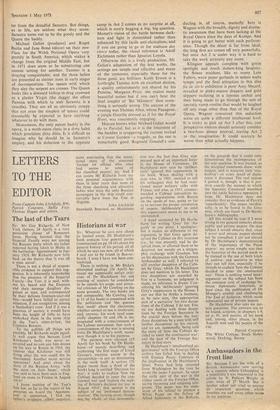Historians at war
Sir: Whatever he says now about its limited scope, Dr Hazlehurst's book contains four general points (summarised on pp.14-16) about the general history of his period, all of which he says are new, all of which I said are to be found in Beaver- brook. I note I have not been con- tradicted.
There is nothing in Mr Blake's attempted analogy (24 April) be- tween my supposedly unfair criti- cism of Dr Hazlehurst for not treating of matters he considered to be outside his scope, and poten- tial criticism of Mr Cowling on the same grounds. The two books are not comparable. Mr Cowling (see p. I I of his book) is concerned with the politicians and 'the guesses they made' about the electorate, whether correct or not is irrelevant; and. anyway, his work (and espe- cially chapters 10 and 19) is im- pregnated with a consciousness of the Labour movement. Just such a consciousness of the war is missing from Dr Hazlchurst's work, neces- sary though it is to his purpose.
The purpose now claimed (17 April) for his book by Dr Hazle- hurst—of merely describing and explaining 'the first stage of Lloyd George's wartime ascent to the premiership—is not so dominating in the work itself. A section 121 pages (more than a third of the book) long is entitled 'Decision for war'; it seeks to explain 'how the Cabinet decided to enter the con- tinental war' and 'explain the mak- ing of Britain's decision for war in August 1914'; this section is the subject of my 'prolonged demon- stration'. The turning-point, though not,,the whole. of that demonstra-
tion was the fact that Grey sup- pressed part of an important letter in the House of Commons. Dr Hazlehurst now says he 'deliber- ately' ignored this suppression in his book. When dealing with a man who, in 1905, omitted to tell his colleagues that he had sanc- tioned secret military talks with France, and who, in 1915, counter- manded a Cabinet instruction re- garding . negotiations with Russia on the spoils of war, going so far as to prevent the proper circulation of papers, 'deliberately' to omit this suppression seems to me to be unexpected.
I stand corrected by Dr Hazle- hurst for writing 'Grey' for 'As- quith' at one point. I apologise: but it makes no difference to my argument, in that Grey again de- ceived the Cabinet on this occasion (i.e., he was present); and he de- ceived them, or allowed them to be deceived, not merely on a telegra- phic exchange with Goschen, but on his discussions with the German Ambassador as well. I referred to still another deception of the Cabi- net by Grey, which Dr Hazlehurst does not mention in his letter. The two deceptions are recorded by him in a footnote; no judgment is made, no inference is drawn. Con- sidering his 'deliberately' ignoring Grey's suppression in the House. I can see that he thinks a footnote, as he now says, 'the appropriate part of a narrative' for two decep- tions of the Cabinet. I do not. For, we are dealing with three decep- tions by the Foreign Secretary in the crucial days before the war; three deceptions by a man with still further deceptions on his record: and we are. supposedly, being told the story of 'how the Cabinet de- cided to enter the continental war'. and the part of the Foreign Sec- retary in that story.
Dr Hazlehurst's 'unadvertised ac- quaintance' with the Foreign Office archive has failed him in dealing with Eustacc Percy. Contrary to the implication in Dr Hazlehurst's letter, Percy had long returned from Washington by the time he wrote the paper I quoted: he spent the early part of the war in the cipher room of the Foreign Office, seeing incoming and outgoing tele- grams. The paper was his state- ment of his refusal to prepare a White Paper on the failure of Allied diplomacy in the Balkans. on the grounds that it could only demonstrate the incompetence of the war machine. It was treated, as the marginal comments show, with respect, and is accurate (not 'mis- leading') on every detail of diplo- macy it discusses. The real reason I quoted it, though, is that it pre- dicts exactly the manner in which the Supreme Command stumbled into the futile Salonica operation. I hope Dr. Hazlehurst does not consider that as evidence of Percy's 'superficiality'. The paper, inciden- tally, is to be found in the Grey :Ass, which are listed in Dr Hazle- hurst's bibliography. All this would be true if I were wrong in my general remarks about public and private papers. On that subject I would observe that, since I never said private papers should not be consulted, I am not moved by Dr Hazlehurst's demonstration of the importance of the Pease papers: my point simply was that the historian of the period needs to be trained in the use of both kinds of archive, and sensitive to what they can tell him, especially if he intends to explain 'how the Cabinet decided to enter the continental war'. There is nothing novel here: argument on the subject has been the common coin of exchange be- tween diplomatic historians, at least since the publication of Dr Monger's erudite and challenging The End of Isolation, which made substantial use of private papers.
Dr Hazlehurst also asks me cer- tain questions. The answers are to he found, seriatim, in chapters 1-9, on p. 41, and passim, of his book and, among other places, in the Asquith kiss and the papers of the CID.
Patrick Cosgrave The White Cottage, South Holm- wood, Dorking, Surrey


































 Previous page
Previous page